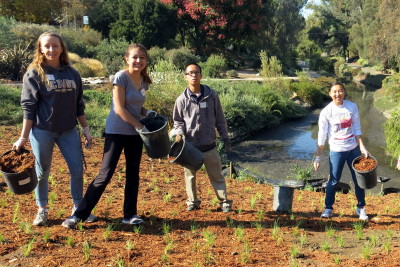
Experts at the Center for American Progress proposed a new for-credit service-learning program for U.S. colleges and universities in a report released Wednesday. The Credit for Serving report proposes that colleges create an option for students to earn college credit while performing long-term community service.
The proposal would create programs to place students in a national service project for one year of a four-year college experience or one semester of a two-year program, the report stated.
Shiv Rawal, one of the four authors of the report, said these programs would not just replace a semester of school, but would complement the student’s preexisting graduation track.
“One of the key parts of our proposal is that colleges award credit for the service experience and supplement that year of service with academic courses that align with the student’s degree plan,” Rawal, the Center’s special assistant for its economic policy team, said. “We don’t want students to have to choose between participating with service and graduating on time.”
According to the research attributed in the report, learning through service has a positive impact on leadership and academic outcomes. Rawal said after observing good examples of schools with such established programs, he decided to use those examples as a model.
“If we propose a way to make it easier for colleges to create these programs in a way that more students can afford to participate, it would be a powerful way to address challenges in communities across the country and prepare college students with skills they need for the workforce,” Rawal said.
Rawal added that the goal of the proposal is to prepare students from all backgrounds for both future service and professional experiences. If universities and colleges comply, the conversation of national service would open up to a larger community.
“We really want these kinds of service programs to be accessible to all kinds of students,” he said. “We think the benefits of service are applicable to everyone across socioeconomic backgrounds. Hopefully, it will doable for all ranks of universities.”
Rawal said he hopes universities like BU will take notice of the report and its findings.
BU spokesman Colin Riley said the university’s program provides a landscape for students to get engaged with the community.
“Boston University has a very active program through the Community Service Center, Alternative Service Break and FYSOP [First-Year Student Outreach Project]. A very significant percent of students continue either involvement through four years of school through the Community Service Center by coming through that foundation program,” Riley said. “It really is a terrific success story and Boston University has a lot to be proud about.”
Elisabeth Symczak, an academic counselor in the College of Communication, chaperoned an Alternative Service Break trip to Orland, Maine, this spring, where her group served the “Homelessness and Housing” focus area. Given her experience, she said, she supports programs like Rawal’s.
She was involved with students who voluntarily gave up their spring break for service, but said programs that offer credit would open up service to those who would not dedicate the time on their own.
“I would love to have service learning program like they talk about in the report. You can’t necessarily require students to be a part of this [though],” Symczak said. “You get the really driven people who would give up their spring break. Hopefully a more established program would draw a larger group of people.”
Several students said community service is beneficial for personal and professional growth, but debated whether taking at least a semester off classes is equally useful.
Meghan Eppinette, a senior in Sargent College of Health and Rehabilitation Sciences, said community service is something that should add to traditional coursework, not replace it.
“It’s good to get people involved in doing community service, but I’m not sure if an entire semester would be a good idea because it’s a long time to go away from your studies to volunteer,” Eppinette said. “It’d be good to incorporate in maybe a class that’s free during the semester where you do a couple hours a week.”
Angela Chen, a sophomore in the College of Arts and Sciences, said she supports the idea of taking a semester off of classwork for community service.
“It’s good to have a chance to interact with the community,” Chen said. “I get that Boston’s our campus, so it’s nice to push students to be out there in the world and accomplish something for the city.”
Chen, a pre-med student, said the chance to volunteer in her future field would be a valuable experience.
“If I had the opportunity to do work with the hospitals around here for credit, that would be amazing,” Chen said. “It would open so many doors.”
James Thaney, also a sophomore in CAS, shared the sentiment.
“I feel like especially if you could find a service thing that is relevant to your major and what you want to do, it would be amazing,” Thaney said. “You could just help the community.”





















































































































